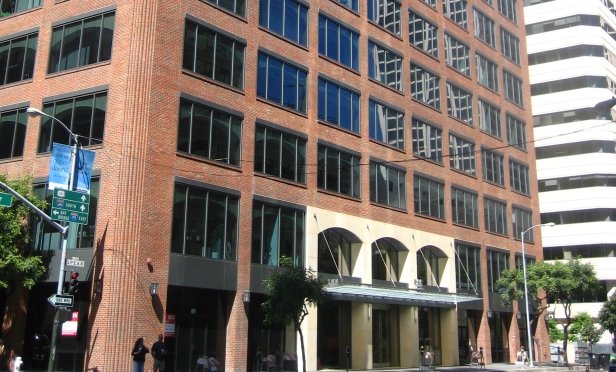 Shorenstein's LEED Platinum 188 Spear is featured as one of the top performers on the Arc home page.
Shorenstein's LEED Platinum 188 Spear is featured as one of the top performers on the Arc home page.
SAN FRANCISCO—High-performance development includes a healthy indoor environment that enhances employee productivity and well being as well as minimizing the impact to the surrounding community. So it's good for society but is it good for revenues? When lower lifetime costs are added to this equation, a resounding number of companies say yes.
Simpson Manufacturing Co. Inc., provider of engineered structural connectors and building solutions, released its inaugural Sustainability, Environmental and Social Responsibility Report, highlighting the company's commitment to sustainable business practices, and environmental and social responsibility to its employees and stakeholders. Simpson's founder Barclay Simpson instilled core values, created the company culture and established its reputation as a quality, trusted manufacturer.
"As a company, we're honored to continue his legacy as a responsible corporate citizen. Since our founding in 1956, we have established deep-rooted core values that continue to define our business today," says Karen Colonias, president and chief executive officer of Simpson. "At the forefront of these values is doing what's right for our people, customers, communities and environment. Through this inaugural report, we are striving to better communicate our sustainability, environmental and social responsibility efforts over the years to showcase why Simpson is an attractive investment beyond just the numbers."
Simpson Manufacturing's financial results for the fourth quarter of 2019 and full year of 2019 compared the quarter ending December 31, 2019 with the quarter ending December 31, 2018 and the fiscal year ending December 31, 2019 with the fiscal year ending December 31, 2018.
Its 2019 financial results show net sales of $262.5 million increased 8.5% compared to $241.8 million. Moreover, North America net sales of $226.8 million increased 10.8% compared to $204.7 million, primarily due to both increased sales volume and higher average unit prices.
"We made significant operational and financial progress in 2019 resulting in solid organic growth, enhanced operating efficiencies and improved profitability," comments Colonias. "Our 2019 net sales improved 5.4% over 2018 to $1.14 billion, driven by higher sales volume. However, our fourth quarter gross margin of 41.9% remained under pressure. As such, our 2019 full-year gross margin of 43.3% was slightly lower than anticipated due to increased material, labor, factory and overhead costs, and to a lesser extent, sales mix. We successfully maintained our focus on rationalizing our cost structure in 2019, resulting in a 100 basis point year-over-year improvement in our total operating expenses as a percentage of net sales to 27.9%. As a result, we generated strong earnings of $2.98 per diluted share, up 9.6% over 2018. As a testament to our ongoing confidence in our business, we were pleased to have returned $101.1 million to our stockholders through share repurchases and dividends. Looking ahead to fiscal 2020, we remain focused on progressing towards our financial targets to position Simpson for long-term sustainable and profitable growth."
Another Bay Area firm, Shorenstein Properties, was one of the first real estate companies in the country to formalize a green initiative with a strong commitment to energy conservation and responsible environmental practices. It continues to employ operational best practices by setting annual goals and measuring performance through national and international benchmarks such as LEED, Energy Star, Green Lease Leaders, the US Department of Energy Better Buildings Challenge and Global Real Estate Sustainability Benchmark. These efforts have added measurable value to its portfolio through reduced operating expenses and increased tenant satisfaction.
"We've operated the green initiative for 10 years," Bill Whitfield, Shorenstein's general manager and sustainability program manager, tells GlobeSt.com. "Buildings need to be operational and sustainability only adds value to the return on investment for a company. I can't find any examples other than positive. And, now, the true effects of climate change are upon us so it is time to act for many companies. We were ahead of the game but we are in the exploratory states of decarbonization methods in order to reduce the average amount of carbon in primary energy in addition to renewable energy sources."
Upon achieving its environmental performance targets ahead of the original 2020 timeline, Shorenstein outlined new goals for 2025 including a 40% reduction in energy use and a 40% reduction in greenhouse gas emissions over a 2008 baseline measurement as well as a 6% reduction in water use and a 20% increase in recycling over a 2016 baseline measurement. Shorenstein also continues its decade-long support of the US Department of Energy's Better Buildings Initiative through annual progress updates and the sharing of energy solutions. Although LEED is a common benchmark, Shorenstein building staff make every effort to operate buildings as sustainably as possible and are consistently recognized for those efforts, GlobeSt.com learns.
© Touchpoint Markets, All Rights Reserved. Request academic re-use from www.copyright.com. All other uses, submit a request to [email protected]. For more inforrmation visit Asset & Logo Licensing.







